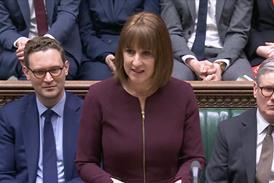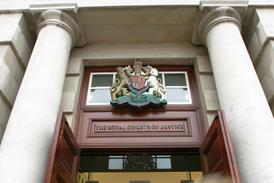Decisions filed recently with the Law Society (which may be subject to appeal)
Duncan Peter Burtwell
Application 12301-2022
Admitted 2004
Hearing 30 March 2022
Reasons 8 April 2022
The Solicitors Disciplinary Tribunal ordered that the respondent should be struck off the roll.
While in practice as a solicitor at Scott-Moncreiff and Associates Ltd, the respondent had failed to disclose to instructed counsel, the defendant and the court, a document (the warrant) which was in his possession and which was relevant to proceedings where he was instructed on behalf of A, thereby breaching principles 1, 2 and 6 of the SRA Principles 2011 and failing to achieve outcome 5.1 of the SRA Code of Conduct 2011.
He had signed a witness statement which was filed in court proceedings and served on the other party in litigation, which was misleading in that it omitted to mention the fact that the warrant was available evidence in his possession at that time, thereby breaching principles 1, 2 and 6 of the 2011 Principles and failing to achieve outcome 5.1. He had acted dishonestly .
He had signed a witness statement which was filed in court proceedings and served on the other party in litigation, which was misleading in that it contained inaccurate statements as to his knowledge and possession of the warrant, thereby breaching principles 1, 2, 4 and 5 of the SRA Principles 2019, and paragraph 1.4 of the Code of Conduct for Solicitors, RELs and RFLs 2019. He had acted dishonestly.
The parties had invited the SDT to deal with the allegations in accordance with a statement of agreed facts and outcome.
The SDT was satisfied on the balance of probabilities that the respondent’s admissions had been properly made.
He had admitted serious misconduct involving misleading the court and dishonesty which struck at the heart of what the public would expect of a solicitor.
The allegations spanned several months and the conduct was not momentary. The case did not belong to the narrow category where exceptional circumstances meant that a lesser sanction might be appropriate, notwithstanding the finding of dishonesty.
The seriousness of the conduct and maintaining public confidence in the profession and its reputation required no lesser sanction than that the respondent be removed from the roll.
The respondent was ordered to pay costs of £15,000.
Nicola Thompson and Ruth Alison Linda Rush
Application 12284-2021
Hearing 3 March 2022
Reasons 30 March 2022
The SDT ordered that the first respondent (admitted 1999) should pay a fine of £10,000. It further ordered that the first respondent should be subject to the following conditions: that she might not (i) practise as a sole practitioner or sole manager or sole owner of an authorised or recognised body; (ii) be a head of legal practice/compliance officer for legal practice or a head of finance and administration/compliance officer for finance and administration; or (iii) hold or receive client money, or act as a signatory to any client or office account or have the power to authorise transfers from any client or office account; with liberty to apply to the tribunal to vary those conditions.
It ordered that the second respondent should pay a fine of £7,501, and it further ordered that as from 3 March 2022 except in accordance with SRA permission: (i) no solicitor should employ or remunerate the second respondent in connection with the practice carried on by that solicitor; (ii) no employee of a solicitor should employ or remunerate the second respondent in connection with the solicitor’s practice; (iii) no recognised body should employ or remunerate the second respondent; (iv) no manager or employee of a recognised body should employ or remunerate the second respondent in connection with the business of that body; (v) no recognised body or manager or employee of such a body should permit the second respondent to be a manager of the body; (vi) no recognised body or manager or employee of such a body should permit the second respondent to have an interest in the body; and (vii) no recognised body or manager or employee of such a body should permit the second respondent to be a compliance officer for legal practice or compliance officer for finance and administration.
The first respondent, while practising as a partner at Bottrills Solicitors LLP, and the second respondent, while a manager of the firm (a recognised body) and practising as a partner, had caused or allowed the client account to be overdrawn, in particular: (i) causing or allowing payments out of the client account in excess of the funds held for individual clients; (ii) causing or allowing duplicate payments from the client account in relation to 17 client ledgers; and (iii) causing or allowing client funds to be held in the firm’s office account, thereby breaching principles 6, 8 and 10 of the SRA Principles 2011, and rules 6 and 20.9 of the Solicitors Accounts Rules 2011.
In relation to the shortages set out above, they had caused or allowed the firm to operate with a client account shortage from 25 April 2016 to 5 December 2017 and had therefore breached principles 6 and 8 of the 2011 rules.
They had caused or allowed the operation of a client ledger account which they had used to post client to office account transfers that were not allocated to specific client matters, thereby breaching principles 6, 8 and 10, and rules 6 and 29.25 of the rules.
They had failed to comply with the rules in that they had (i) failed to ensure the firm carried out client account reconciliations at least once every five weeks; (ii) failed promptly to inform in writing, clients or any other person on whose behalf money was held, of the amount and reason for retaining client money at the end of the matter, thereby breaching principles 6, 8 and 10, and rules 6, 14.4 and 29.12 of the rules.
They had failed to report, or ensure that a report was made, to the SRA in respect of various of those matters, thereby breaching or failing to achieve principles 6 and 7; outcomes 10.1 and 10.3 of the SRA Code of Conduct 2011; and rule 8.5(e) of the SRA Authorisation Rules 2011.
The parties had invited the SDT to deal with the allegations against the respondents in accordance with a statement of agreed facts and outcome. The SDT had reviewed all the material before it and was satisfied on the balance of probabilities that the respondents’ admissions had been properly made.
The SDT noted that the respondents had self-reported, and had not been motivated by financial gain.
A financial penalty was the appropriate sanction for the first respondent. A fine of £10,000 was appropriate and proportionate.
The need to protect the public and the reputation of the profession was such that the second respondent should be subject to regulatory control under section 43 of the Solicitors Act 1974. It was also appropriate for the second respondent to pay a financial penalty in the sum of £7,501.
Accordingly, the SDT approved the proposed sanction.
The respondents were each ordered to pay costs of £14,487.50.
Karen Todner
Application 12209-2021
Admitted 1987
Hearing 29 March 2022
Reasons 21 April 2022
The SDT ordered that the respondent should pay a fine of £25,000, and further that she should be subject to the following conditions imposed by the SDT: that she might not (without the prior written consent of the SRA or the prior written permission of the SDT): (i) act as COFA, COLP or MLRO in any authorised or recognised body; or (ii) act as a signatory to any client or office account or have the power to authorise transfers from any client or office account, save for routine office expenses limited to £100 per authorisation when her co-owner was unavailable or otherwise in any authorised or recognised body; with liberty to apply to the SDT to vary those conditions.
As a solicitor, director and managing director of Kaim Todner Solicitors Ltd and thereafter, in relation to client C, and between June 2014 and October 2017 in relation to Client P, she had caused or allowed sums received by KTS for unpaid professional disbursements to be retained in the KTS office account for a period in excess of that allowed under rule 17.1(b) of the SRA Accounts Rules 2011, in circumstances where the relevant client ledgers erroneously showed the same monies had been paid out to counsel, and in doing so had breached principles 6, 8 and 10 of the SRA Principles 2011, and rules 14.1, 17.1, 29.1, 29.2 and 29.4 of the 2011 rules.
From March 2015 onwards, in relation to client S, she had caused or allowed sums received by KTS for unpaid disbursements to be retained by KTS, in circumstances where the relevant client ledger erroneously showed the said monies had been paid out to counsel, and, following the writing off of the disbursements to which such sums related, had failed to cause the sums to be returned to the client, thereby breaching principles 6, 8 and 10, and rules 14.1, 17.1, 29.1, 29.2 and 29.4 of the rules.
From June 2014 onwards, by reason of the above facts and matters, she had caused or allowed minimum cash shortages in the sum of up to £99,480 to have existed on the client account of KTS, thereby breaching principles 6, 7, 8 and 10, and rules 7.1 and 7.2 of the 2011 rules, and rule 6 of the SRA Accounts Rules 2018.
By reason of the above matters (to the extent that they had arisen on or before 2 March 2016), she had failed to comply with her obligations as KTS’s COFA, in that she had failed to ensure that the firm and its managers and employees had complied with the 2011 rules, thereby breaching rule 8.5 of the SRA Authorisation Rules 2011, and principle 8.
The parties had invited the SDT to deal with the allegations against the respondent in accordance with a statement of agreed facts and outcome.
The SDT had reviewed all the material before it and was satisfied on the balance of probabilities that the respondent’s admissions had been properly made.
Given her experience at the time, and her role as vice president of the SDT, the respondent must have appreciated that she was a role model who needed to conduct herself accordingly.
However, there was no allegation of recklessness, lack of integrity or dishonesty.
In all the circumstances a proposed fine of £25,000, coupled with the proposed restrictions on practice, was appropriate.
The respondent was ordered to pay costs of £21,055.
Christopher Attwood Messenger
Application 12282-2001
Admitted 1974
Hearing 28 March 2022
Reasons 8 April 2022
The SDT ordered that the respondent should pay a fine of £5,000.
It further ordered that he should be subject to the following conditions imposed by the SDT: that he might not: (i) practise as a sole practitioner or sole manager or sole owner of an authorised or recognised body; (ii) be a partner or member of a limited liability partnership, legal disciplinary practice or alternative business structure or other authorised or recognised body; or (iii) be a compliance officer for legal practice or a compliance officer for finance and administration; with liberty to apply to the SDT to vary those conditions.
While the respondent was the sole principal of Messenger & Co a shortage of £5,064 existed on the firm’s client account, by reason of the existence of which the respondent had breached principles 6, 7 and 10 of the SRA Principles 2011, and rules 7.1 (Company B only), and 20.9 of the SRA Accounts Rules 2011.
The respondent had provided a banking facility to Company B through the firm’s client account, thereby breaching principles 6 and 7, and rule 14.5 of the 2011 rules.
He had failed to complete client account reconciliations as required by the SRA Accounts Rules, thereby breaching principles 6 and 7, and rule 29.12 of the rules.
He had retained residual balances on 38 client matter ledgers to a total value of £19,921.29. The relevant clients had not been notified every 12 months that balances continued to be held on client account in respect of their completed matters. The respondent had thereby breached principles 6 and 7, and rules 14.3 and 14.4 of the rules.
The parties had invited the SDT to deal with the allegations against the respondent in accordance with a statement of agreed facts and proposed outcome.
The SDT was satisfied on the balance of probabilities that the respondent’s admissions had been properly made.
The misconduct was a result of the respondent’s carelessness and was not deliberate. He had made full and frank admissions and had cooperated fully with the investigation.
A fine in the sum of £5,000 adequately reflected the seriousness of the misconduct. Accordingly, the SDT approved the proposed sanction.
The respondent was ordered to pay costs of £7,500.




























